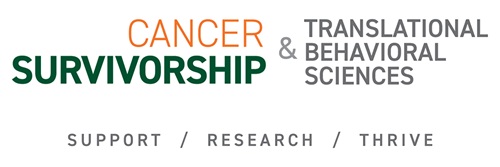Information
To learn more about cancer survivorship research at Sylvester, please call 305-243-3329 or
email Survivorship Research.
Whether your sarcoma treatment has removed the cancer or you need ongoing treatment such as radiation therapy or chemotherapy to control it or stop it from growing, you’re a sarcoma survivor. Even if the cancer is gone, you still need ongoing care to manage any side effects, make sure you stay healthy, and ensure that cancer hasn’t returned.
At Sylvester Comprehensive Cancer Center, we provide comprehensive survivorship care for sarcoma survivors receiving active treatment or follow-up care. Your survivorship visits include a physical exam and any necessary tests, such as imaging or blood tests. You get expert guidance and attention to help you feel your best – including the latest approaches to relieve treatment side effects. Also, we help you make positive lifestyle changes to enhance your health, including expert advice about nutrition, exercise, and more.
At first, your sarcoma survivorship visits will be every few months and then twice a year after that. Eventually, you’ll have yearly checkups.
Can sarcoma go into remission?
Remission means there’s no evidence of cancer, and you don’t have symptoms. It can be temporary or permanent. Many remissions are permanent, but the uncertainty can be difficult. That’s why it’s essential to talk to your doctor about your risk of cancer coming back so that you’re prepared if it returns. We understand this can be stressful, and our mental health experts are here to support you.
It helps to know that you have an expert team on your side. As an NCI-designated cancer center and one of only four designated Cancer Centers of Excellence in Florida, Sylvester offers leading-edge treatment, including targeted therapies, advanced radiation therapy approaches, and innovative treatments like NanoKnife®.
Can I lower my risk of sarcoma progressing or coming back?
Although there’s no proven way to stop the progression or recurrence of sarcoma, you can make lifestyle changes to get healthier and possibly lower your risk. These habits can improve your health:
- Maintain a healthy weight, and eat a healthy diet of unprocessed foods like whole grains, vegetables, and lean meats. Avoid red meats and foods high in fat, sugar, and salt.
- Exercise and stay active throughout the day.
- Don't drink alcohol. If you do, limit how much you drink – no more than one drink daily for women or two for men.
- Don’t smoke – it raises your risk for many cancers and other health problems.
Most sarcoma recurrences or spread to other areas of your body (metastases) are found within the first two to five years after treatment. After five years, the risk is significantly lower, but there’s still a risk.
Some sarcoma survivors may develop another, unrelated cancer later in life, but they have a higher risk of getting certain types of cancer:
- Soft tissue sarcoma survivors are at greater risk for melanoma, acute myeloid leukemia (AML), and bone, stomach, and thyroid cancers.
- Bone sarcoma survivors are at greater risk for other types of bone cancer, AML, and lung, esophageal, stomach, colorectal, liver, and pancreatic cancers.
Survivorship visits allow us to keep an eye on your health and discover cancer early when it’s most successfully treated.
What is a sarcoma survivorship care plan?
A personalized survivorship care plan based on input from your cancer care team is a vital part of your sarcoma survivorship care. This comprehensive document gives you and your healthcare providers information about your cancer treatments and recommended follow-up visits.
You learn about potential side effects and how to manage them. You also get advice on healthy living and information about local and national resources available for sarcoma survivors and families – with access to all our cancer support services and education.
We understand that each survivor’s experience with sarcoma and treatment is different. That means you get personal attention to manage any problems or changes as they arise. You have peace of mind knowing you can rely on an experienced team if you have questions or concerns going forward.
What are sarcoma treatment side effects?
Many sarcoma treatment side effects go away after treatment stops, but some symptoms can continue or develop long after treatment is over (late effects).
Young people with sarcoma are more likely to experience late effects – particularly children treated for Ewing sarcoma, who are at greater risk for heart or lung problems, slowed growth and development, reproductive problems, or learning difficulties.
Sylvester offers a full range of treatments to relieve symptoms and help you feel better – from acupuncture and pain relief to specialized services for teens and young adult cancer survivors.
Chemotherapy side effects
Most chemotherapy side effects go away once treatment is finished – such as tiredness, nausea, and hair loss – but some medicines can weaken the heart muscle (cardiomyopathy) or cause nerve damage.
Radiation therapy side effects
Although radiation therapy targets cancer, it may still cause temporary side effects during treatment, such as tiredness, nausea, and skin problems. Children are more likely to experience late effects of radiation therapy.
Sarcoma surgery side effects
One of the most common side effects of sarcoma surgery is swelling (lymphedema) in an arm or leg where a tumor is removed. Other side effects may include damage to blood vessels, infections, or wound healing problems. We offer various approaches to treat surgery-related side effects.
How can I learn more about long-term follow-up care for sarcoma survivors?
Follow-up care is essential to keeping you healthy and ensuring you have the highest quality of life possible. To learn more about our survivorship care program and personalized services for bone and soft tissue sarcoma survivors, email us at SCCCSURVIVORSHIP@miami.edu.
